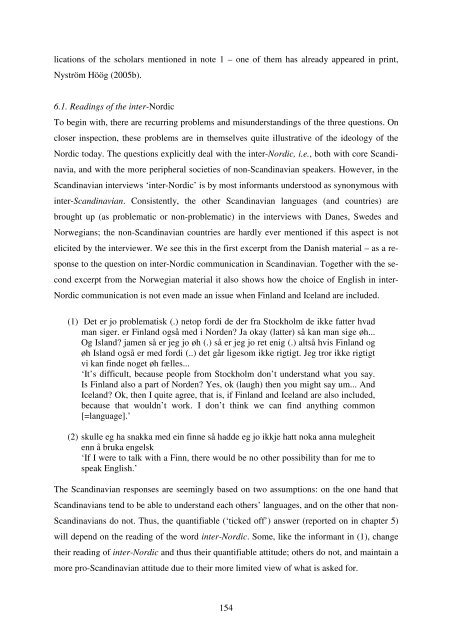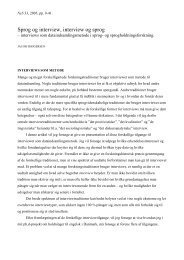Hør dog hvad de siger - Note-to-Self: Trials & Errors
Hør dog hvad de siger - Note-to-Self: Trials & Errors
Hør dog hvad de siger - Note-to-Self: Trials & Errors
You also want an ePaper? Increase the reach of your titles
YUMPU automatically turns print PDFs into web optimized ePapers that Google loves.
lications of the scholars mentioned in note 1 – one of them has already appeared in print,<br />
Nyström Höög (2005b).<br />
6.1. Readings of the inter-Nordic<br />
To begin with, there are recurring problems and misun<strong>de</strong>rstandings of the three questions. On<br />
closer inspection, these problems are in themselves quite illustrative of the i<strong>de</strong>ology of the<br />
Nordic <strong>to</strong>day. The questions explicitly <strong>de</strong>al with the inter-Nordic, i.e., both with core Scandi-<br />
navia, and with the more peripheral societies of non-Scandinavian speakers. However, in the<br />
Scandinavian interviews ‘inter-Nordic’ is by most informants un<strong>de</strong>rs<strong>to</strong>od as synonymous with<br />
inter-Scandinavian. Consistently, the other Scandinavian languages (and countries) are<br />
brought up (as problematic or non-problematic) in the interviews with Danes, Swe<strong>de</strong>s and<br />
Norwegians; the non-Scandinavian countries are hardly ever mentioned if this aspect is not<br />
elicited by the interviewer. We see this in the first excerpt from the Danish material – as a re-<br />
sponse <strong>to</strong> the question on inter-Nordic communication in Scandinavian. Together with the se-<br />
cond excerpt from the Norwegian material it also shows how the choice of English in inter-<br />
Nordic communication is not even ma<strong>de</strong> an issue when Finland and Iceland are inclu<strong>de</strong>d.<br />
(1) Det er jo problematisk (.) ne<strong>to</strong>p fordi <strong>de</strong> <strong>de</strong>r fra S<strong>to</strong>ckholm <strong>de</strong> ikke fatter <strong>hvad</strong><br />
man <strong>siger</strong>. er Finland også med i Nor<strong>de</strong>n? Ja okay (latter) så kan man sige øh...<br />
Og Island? jamen så er jeg jo øh (.) så er jeg jo ret enig (.) altså hvis Finland og<br />
øh Island også er med fordi (..) <strong>de</strong>t går ligesom ikke rigtigt. Jeg tror ikke rigtigt<br />
vi kan fin<strong>de</strong> noget øh fælles...<br />
‘It’s difficult, because people from S<strong>to</strong>ckholm don’t un<strong>de</strong>rstand what you say.<br />
Is Finland also a part of Nor<strong>de</strong>n? Yes, ok (laugh) then you might say um... And<br />
Iceland? Ok, then I quite agree, that is, if Finland and Iceland are also inclu<strong>de</strong>d,<br />
because that wouldn’t work. I don’t think we can find anything common<br />
[=language].’<br />
(2) skulle eg ha snakka med ein finne så had<strong>de</strong> eg jo ikkje hatt noka anna mulegheit<br />
enn å bruka engelsk<br />
‘If I were <strong>to</strong> talk with a Finn, there would be no other possibility than for me <strong>to</strong><br />
speak English.’<br />
The Scandinavian responses are seemingly based on two assumptions: on the one hand that<br />
Scandinavians tend <strong>to</strong> be able <strong>to</strong> un<strong>de</strong>rstand each others’ languages, and on the other that non-<br />
Scandinavians do not. Thus, the quantifiable (‘ticked off’) answer (reported on in chapter 5)<br />
will <strong>de</strong>pend on the reading of the word inter-Nordic. Some, like the informant in (1), change<br />
their reading of inter-Nordic and thus their quantifiable attitu<strong>de</strong>; others do not, and maintain a<br />
more pro-Scandinavian attitu<strong>de</strong> due <strong>to</strong> their more limited view of what is asked for.<br />
154



